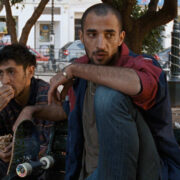Cannes 2019 Days 1 & 2: The Festival Opens With Zombies, Revolutions & Killer Style
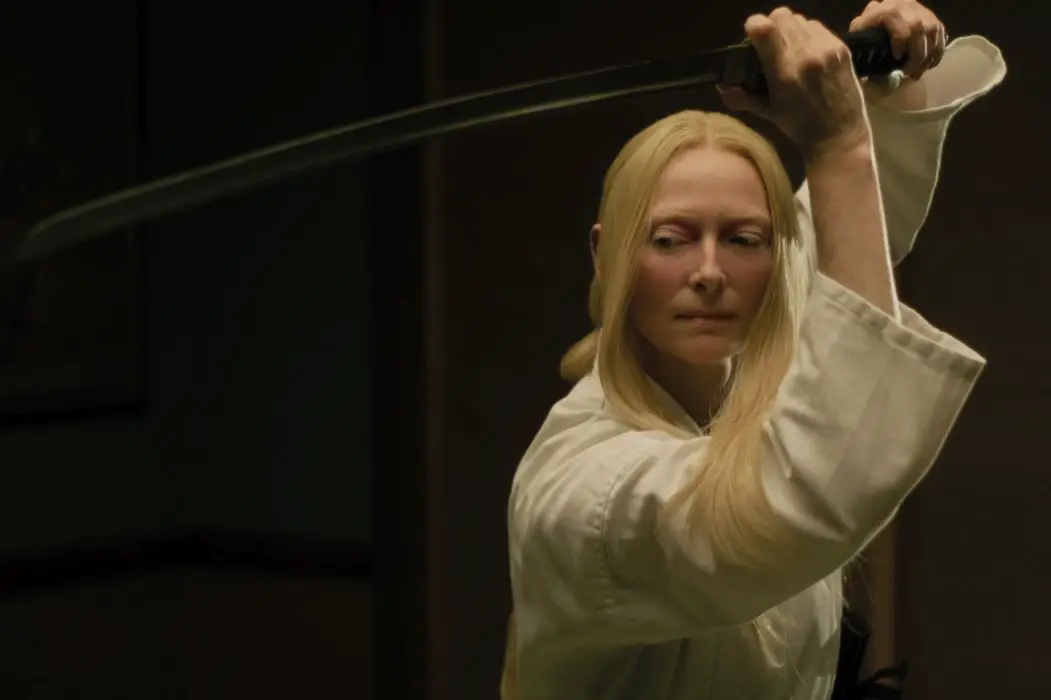
Gus is a 3rd year English Lit and Creative Writing…
Gus Edgar-Chan: Hi Cannes, long time no see. You haven’t changed much – you’re chaotic, queue-heavy, and your press system remains impossibly difficult to navigate. Still, you were good to me last year, so I’ve brought along a friend—Alistair Ryder—for the ride. Together we’ll be capsule reviewing all the films on offer (that we can manage to get into), which means our readers have bi-daily writeups to look forward to! Without further ado:
The Dead Don’t Die (Jim Jarmusch)
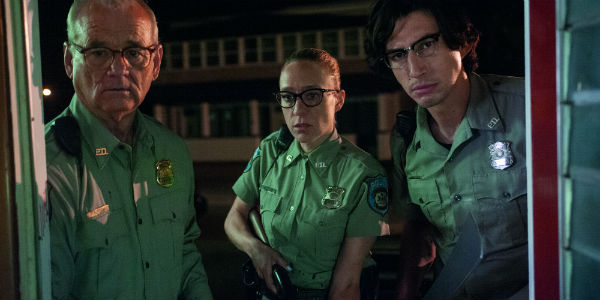
Gus Edgar-Chan: In Jarmusch’s blasé parody, the sleepy town of Centerville (sprawled around a police station and surrounded by towering pines, this is very much Twin Peaks’ comatose cousin), attempt to reckon with a horde of metaphorical zombies. Polar fracking has shifted the earth’s axis, causing chaos to the daylight and awakening the dead. In a film where Selena Gomez swoons over a dweeb’s film knowledge, The Dead Don’t Die isn’t exactly going for realism.
They slaughter the townsfolk and hunt for material possessions; one zombie groans for coffee, another for xanax. Teenage ghouls, meanwhile, crave Wi-Fi. Bill Murray and Adam Driver’s hapless police chiefs, pointedly played with the enthusiasm of someone who’s known that the world is going to destroy itself for a while, sleepwalk through the chaos.
We’ve seen this all before—animals disappearing, graves shifting in the moonlight, guts ripped from flesh—we know what’s going to happen, and we know how this all ends. Jarmusch knows this too: his parody is a cheeky wink, both self-aware and aware of how self-aware it is. Referring to The Dead Don’t Die as a ‘zombie comedy’, though, perhaps undersells it—there’s a few laughs to be had, sure, but the underlying tone is defeatist to the core.
Every gag or wry witticism is served with a nonchalant dose of nihilism, every political jab as blatant as possible because, really, is there any point in being subtle about it anymore? Steve Buscemi’s racist farmer dons a paraphrased MAGA cap, politicians slag off scientists and Tom Waits (in another shaggy nomad role following The Ballad of Buster Scruggs) laments about our fixation on material possessions. The mantra on how to kill a zombie—’aim for the head’—suddenly takes on a new meaning.
And how do the townsfolk confront the apocalypse? Those unprepared succumb to the slaughter, and those that are can do nothing to stop it. Even the inclusion of Tilda Swinton’s Zelda, a Scottish machete-wielding mortician, seems to insist that extreme measures won’t make a difference when we’re confronted with the end of the world.
Jarmusch has brought the B-movie zombie flick back from the dead: this is a disarmingly intelligent riff on politics, parodies, and the futility of it all. Humanity’s final few days are upon us, and we’re all shambling into oblivion. The dead rise and take their vengeance, and at the end of it all, the children are left to pick up the pieces.
Deerskin (Quentin Dupieux)
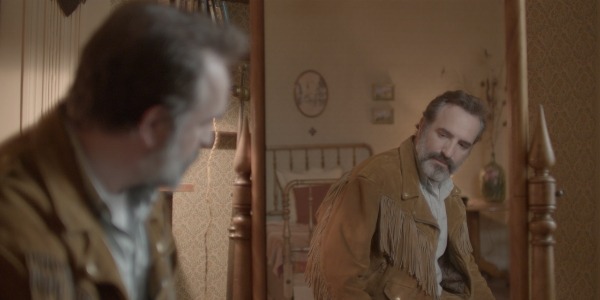
Alistair Ryder: Not counting his prolific electronic music career under the stage name Mr Oizo, Quentin Dupieux first became a significant presence on the festival circuit with his surrealist B-movie tribute Rubber in 2010. From the elevator pitch of “horror movie about a killer tire”, he instead confounded audiences by delivering a tiresome essay on the nature of escapism in genre cinema, that effectively chastised the audience for wanting such simple pleasures from cinema. So what a relief to see that he’s fully evaded his earlier inclinations to just deliver on the promise of his ingenious B-movie premises – and with Deerskin, has delivered a delightfully dark comedy that will surely be a hot ticket on the midnight festival circuit in the months to come.
Jean Dujardin stars as Georges, a man in the middle of an archetypical midlife crisis; his wife has just left him, so he’s uprooted to the countryside and spent nearly 8,000 euros on a secondhand deerskin jacket. He has no money left, after his ex-wife has cut him off from the bank account, so he’s now squatting in a rural hotel, and finds himself falling into a lie when he tells local barmaid Denise (Adele Haenel) that he’s a filmmaker working on a new project. Seeing the footage he’s recorded on his digital camcorder, she believes he’s making a mockumentary on a guy obsessed with his jacket, not realising the truth of his true obsession with the jacket – and the murderous rampage he’s undertaking so his jacket can be the only one left in the world.
From such a loopy premise, it’s to Dupieux’s credit that his film never becomes an insufferable quirk fest – moving in dark directions but never losing sight of the normal world outside of the central character’s increasing insanity. After a brief post-Oscar stint of trying to fit into Hollywood roles, Dujardin has comfortably settled into being a character actor in his native country, and this is his finest role since The Artist; he refuses to settle into caricature, underplaying the quirks so you can understand why he may appear like a functioning person to any passerby. Along with Haenel, who gets the film’s funniest line when discussing her hobby editing pre-existing films only to discover they’re bad when re-edited, Dupieux has found two excellent actors on top of their comedic game, fully committing to the bananas premise and playing it as they would a serious drama.
Deerskin is a hilarious midlife crisis satire, with some of the darkest belly laughs I’m sure to have this year. You’ll never look at a tacky jacket in the same light ever again.
Bull (Annie Silverstein)
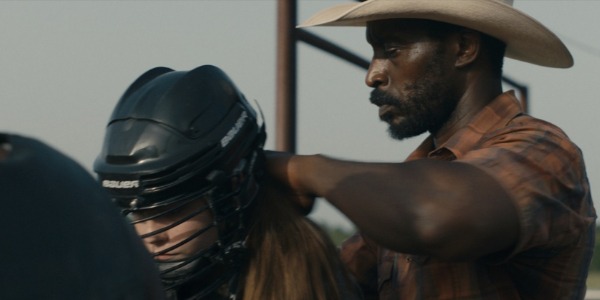
Alistair Ryder: In the past couple of years, some of the most celebrated films on the festival circuit have been character studies set within the American heartlands, brought to life by foreign directors who you’d never guess didn’t know the country first hand. Chloe Zhao’s The Rider andAndrew Haigh’s Lean on Pete are the two high watermarks of this genre, humanising the people that foreign audiences are more likely to stereotype as Trump supporters without bothering to learn anything more about their lives.
Which is why it’s so odd that a similarly themed film from a director born and raised in the US doesn’t have the same power as those made by filmmakers on the outside looking in. Annie Silverstein’s directorial debut Bull has two excellent central performances, but even with those strengths, it seems destined to live in the shadows of the recent works of Zhao and Haigh – and that’s not just because her film feels like a scientific experiment to blend the narratives of those two films into an overly familiar whole. This story should pack an emotional punch, but all it did was remind me of the directors who have recently tackled similar material with far less generic results.
Amber Havard stars as Kris, an unruly 14 year old with a self destructive lifestyle that seems destined to follow the same path as her mother’s, all the way to prison. After breaking into her bullring neighbour Abe’s (Rob Morgan) house to throw a party while he’s out of town, he insists he won’t call the cops if she helps him out in his day to day life, both training children who want a career in the rodeo, and preparing for dangerous competitions. A friendship forms, but after her mother’s stint in prison is extended, her interest in training to participate gets thrown by the wayside in order to do whatever it takes to raise money to look after her younger sister.
To Silverstein’s credit, her film chooses to go down a bleakly realistic trajectory, rather than offer her troubled young protagonist the redemptive arc you’d expect. Havard gives one of the most impressive child performances I’ve seen recently, underplaying the inherent trauma of the film’s later stages in the same manner as a Dardennes heroine – but once you acclimatise to the type of story Silverstein is telling, it quickly becomes predictable, with the performance struggling to differentiate the inherent familiarity of this coming of age tale. If anything, Silverstein’s approach to Kris’ story made me appreciate Lean on Pete all the more, as Haigh managed to apply a gritty unpredictability to a coming of age story that would feel all too familiar in anybody else’s hands.
Bull is likely to receive a rapturous response from any audience member who hasn’t seen the two films mentioned elsewhere in the review – but for those who are familiar with those, Silverstein’s debut doesn’t offer anything to shake up the pre-existing formula, proving to be forgettable even when blessed with two excellent performances.
A Brother’s Love (Monia Chokri)
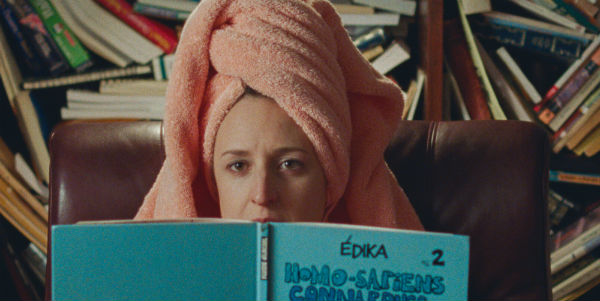
Gus Edgar-Chan: Monia Chokri’s sugar-rush debut, at least for its first half, plays out as if a Xavier Dolan film actually succumbed to the criticisms his dissenters all go on about it. Shouting matches, kinetic jump-cuts and familial flare-ups abound, Chokri’s debut clearly takes inspiration from the enfant terrible (which makes sense: she featured in his 2010 drama, Heartbeats); but the formal work is irrational, the characters irritating, the sight gags lame.
Sophia’s (Anne-Elisabeth Bosse) strong platonic bond with her brother, Karim (Patrick Hivon) is tested when Karim turns his attention to her abortionist, Eloise (Evelyn Brochu) instead. The two become lovebirds, leaving Sophia aimless, depressed, spiteful of Eloise, and afraid of the world’s finality.
Sophia’s sentiments often resonate, but they occasionally turn sour: her envious commentary on how beautiful girls need not be intelligent seemingly muddies her morality, until the film then advocates those same judgements. A Brother’s Love is as conflicted as its protagonist, but this feels more like haphazardous sceenwriting than a confident evocation of a lost-in-life 30-something (see: Jeune Femme).
When its characters start finally straying away from their caricatures (Karim is a loud, rogeish flirt and the siblings’ father is a loud, blathering fool, for instance) and the decibel levels return to normal, A Brother’s Love returns to a steady, meandering cadence, hitting emotional beats when required but not possessing the narrative spunk to match the erratic formalism.
Instead, we’re greeted with a queasy mash-up of Dolan grime and Godard twee, the playfulness at odds with Sophia’s dwindling mental state. By the time the film touches upon its theme of sonder—the profound feeling of realizing that everyone has a life as complex as one’s own—and ends with a stirring finale brimming with the insight the rest of its runtime lacks, you’re left wondering why the camera couldn’t keep still for one moment, relax, and give time for A Brother’s Love medley of messages to linger.
Les Miserables (Ladj Ly)
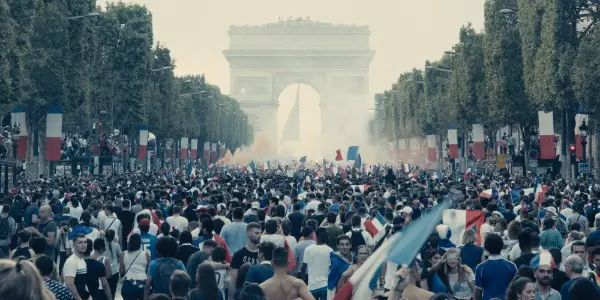
Alistair Ryder: Ladj Ly has a history of documenting police brutality, making a name for himself in 2008 after filming officers firing a flash ball weapon at a handcuffed man – the first time an act of brutality in France led to the officers in question getting suspended from their jobs, at least according to the director’s account of the story. This incident was adapted into a short film, and now acts as a pivotal moment in his feature debut Les Miserables, partially inspired by the police’s monitoring of civilians within the Paris neighbourhood where he grew up.
It’s been many years since the director lived in that suburb, but his film still feels depressingly timely. Les Miserables mostly bypasses incendiary calls to action against the powers that be in order to examine the true cost of keeping the peace with brutal police forces whose very existence relies on a lack of harmony in the neighbourhood. Imagine a less morally problematic Dragged Across Concrete, and you’re halfway there.
In the midst of a summer heatwave, new recruit Stephane (Damien Bonnard) is assigned to help cops Chris and Gwada (Alexis Manenti and Djebril Zonga) in their patrol of a Parisian neighbourhood known for its high crime rate. The pair are not only known for the way they treat citizens, but are proud of the low regard they are held in; Chris is known as the “pink pig”, and his countless stuffed piglet toys in his office to celebrate a nickname designed as an insult. One day, members of the traveller community threaten the peace within the predominantly black, Muslim neighbourhood after one of their circus lions is taken – the quest to retrieve it before they threaten violence leads to the arrest of one young boy, and a backlash from local teens.
The boy is shot with a weapon while handcuffed, and the whole incident is caught on a drone camera. However, the question of whether the footage should be released, risking widespread riots in a neighbourhood prone to unrest, transforms a simple naming and shaming into a much larger moral quandary: should one bad incident be hidden in order to keep the peace? And can the elders of the community remain respected for being complicit in hiding brutality against an unarmed citizen, even if it’s for the purpose of preventing civil unrest in an area still reeling from the last outbursts?
The film is titled after Victor Hugo’s novel, which features multiple scenes in the same neighbourhood, Montfermeil – a not too subtle way of showing that, centuries later, poverty and mistreatment of the working classes by the powers that be are just as prevalent now as they ever were. But if you look past the incendiary third act, which slowly transforms into a clash between police and rioting teens pitched somewhere between La Haine and The Raid, one of the film’s strengths is its surprising subtlety in how it explores the tensions within the neighbourhood. Both the police officers, community leaders and young residents are drawn with nuance, showing their humanity without ever letting them off the hook – if anything, a sequence where self-proclaimed pink pig Chris is shown retreating to the normality of his family life is as damning as his actions on the job.
It’s the rare film to deal with police brutality that effectively sidesteps the racial dynamics of the situation, preferring to view the imbalance of power as a class issue attuned to the worldview of Hugo’s novel. This could be because the concept of race doesn’t exist within the French constitution, so as a result, officers just prey on the most economically deprived areas, which are, sadly, predominantly black neighbourhoods. To international viewers stripped of this context, you can expect countless think pieces upon its theatrical release, although many will overlook the film’s one flaw in its depiction of different cultures. For a film that feels thoroughly lived in, richly observed from the director’s own history, the portrayal of the traveller community dances with offensive caricature. They’re the only people onscreen who are depicted as malicious without nuance, a worrying misstep for a film so dedicated to examining the shades of grey between good and evil that the community finds themselves swimming in just to maintain order.
But overall, Les Miserables is a powerful debut – one that functions as well as a sobering examination of policing in poverty-stricken areas as it does a tense mainstream thriller, that’s sure to be a hit at the French box office.
Does content like this matter to you?
Become a Member and support film journalism. Unlock access to all of Film Inquiry`s great articles. Join a community of like-minded readers who are passionate about cinema - get access to our private members Network, give back to independent filmmakers, and more.
Gus is a 3rd year English Lit and Creative Writing student who loves everything film and still doesn't understand why he didn't study that instead. He is the co-editor for Venue, the arts supplement of his Uni's newspaper, and has written for Little White Lies, ScreenRant, Dog and Wolf, BritFlicks and Outline Norwich.


